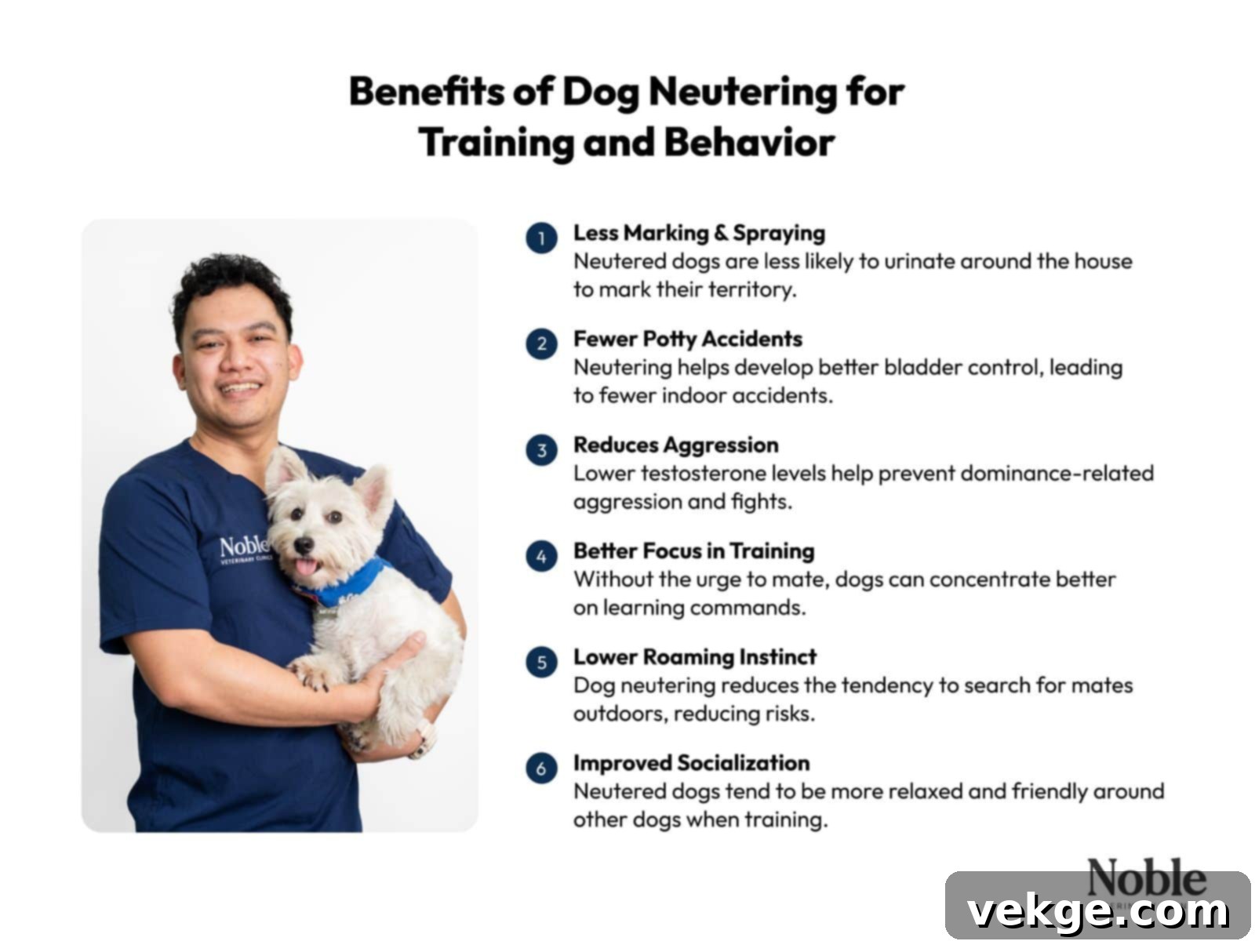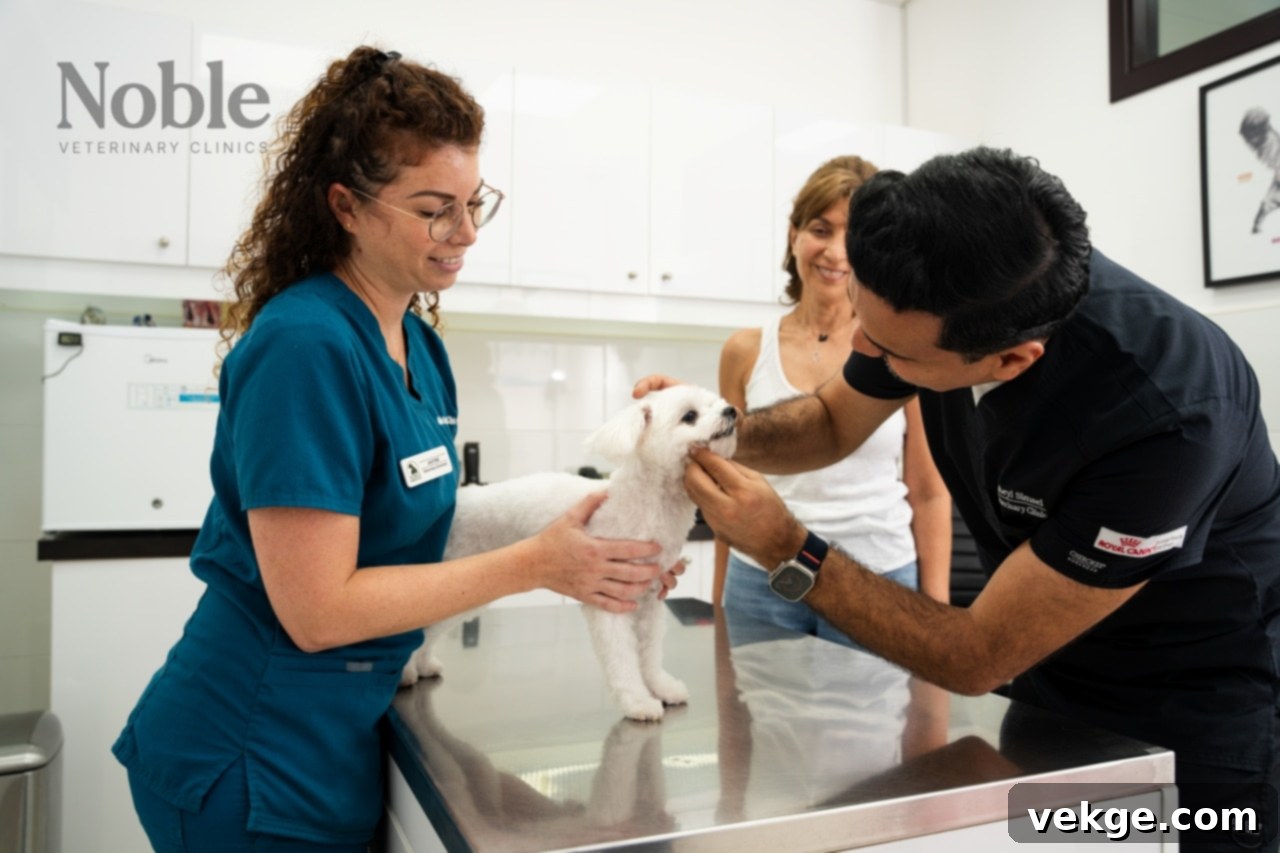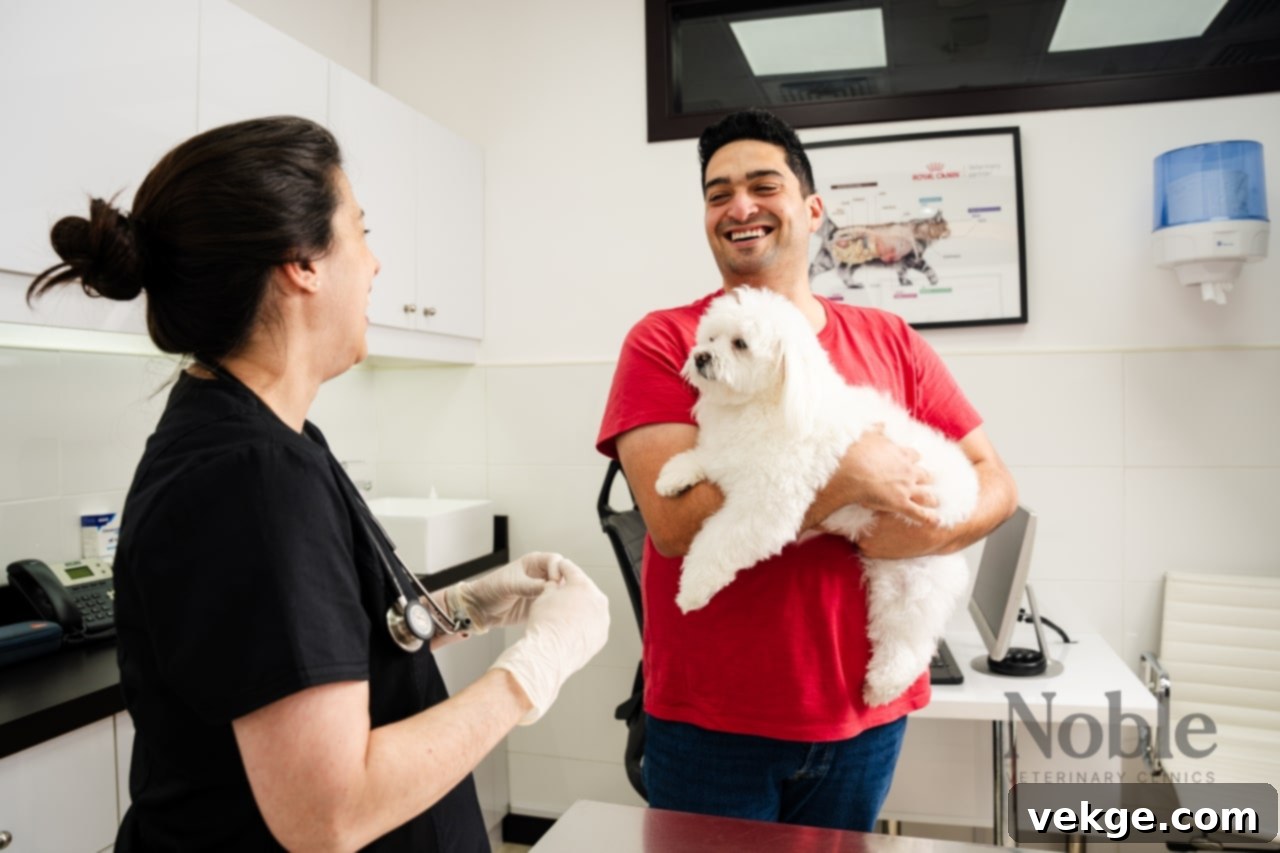Dog Neutering: Essential Benefits for Your Pet, Home, and Community
Dog neutering is a highly common and now routine veterinary procedure performed in most clinics worldwide. It involves a surgical intervention that offers a multitude of benefits for your beloved canine, extending beyond just population control. Pet owners frequently observe significant improvements in their dog’s overall behavior, a reduction in undesirable habits, and a generally healthier, longer life for their furry friends.
Despite its prevalence and well-documented advantages, many pet owners still ponder, “Should I neuter my dog?” This comprehensive guide aims to address that crucial question. We will delve into the intricacies of the neutering procedure, explore its profound benefits for your dog’s health and temperament, and discuss its positive impact on your home environment and the wider community. By the end of this article, you will be equipped with the knowledge to make the most informed decision for your cherished companion.
Understanding Dog Neutering: The Procedure Explained
Before exploring the extensive benefits of dog neutering, it’s crucial to understand what this surgical procedure entails and how veterinarians perform it with the utmost care and precision.
What is Neutering? In general terms, “neutering” refers to the surgical removal of an animal’s reproductive organs. For male dogs, this procedure is specifically called castration, where both testicles are surgically removed. For female dogs, the procedure is known as spaying (or ovariohysterectomy), which involves the removal of the uterus and ovaries. By eliminating these reproductive organs, the risks of certain hormone-driven cancers and behavioral issues are significantly reduced or completely removed.
The Surgical Process: Modern veterinary practices employ advanced techniques to ensure dog neutering is as safe and comfortable as possible for pets. The procedure is performed under general anesthesia, meaning your dog will be completely unconscious and feel no pain during the surgery. Before the operation, veterinarians typically conduct a thorough physical examination and often recommend blood tests to ensure the dog is healthy enough for anesthesia and surgery.
During the surgery, the veterinarian makes a small incision, usually in front of the scrotum for males, or on the abdomen for females. The reproductive organs are then carefully removed, and the incision is closed with sutures that may dissolve internally or require removal after a healing period. Post-operative care includes pain management to ensure your dog recovers comfortably at home. Most dogs recover quickly within 7-14 days, with full healing taking a few weeks. In regions like Dubai, pet clinics are staffed by highly qualified veterinary surgeons who are extensively trained to perform these procedures with expert care, prioritizing your pet’s safety and well-being.
The decision to neuter or spay your dog is a significant one that impacts their entire life, offering both immediate and long-term advantages that contribute to their health and happiness.

|
Alt text An infographic showing the list of dog neutering benefits, including less urine marketing and spraying behavior, fewer potty accidents, and better focus on training. |
Image Source dog-neutering-training-home-benefits-infographic.jpg |
|---|
How Dog Neutering Enhances Training and Behavior
Training a dog requires immense patience, consistency, and a deep understanding of canine behavior. However, certain innate, hormone-driven behaviors can present significant challenges. Dog neutering can play a pivotal role in improving your pet’s trainability and overall demeanor by mitigating these hormone-related distractions and urges.
- Reduced Aggression and Dominance: Intact male dogs, especially, may exhibit higher levels of aggression and dominance towards other dogs, particularly those of the same sex. This can manifest as growling, lunging, or even fighting, making socialization and obedience training difficult and potentially dangerous. Neutered dogs often display less aggressive behavior and are generally more mellow, allowing for more effective and positive obedience training sessions. They are more likely to focus on their human companions and commands rather than asserting dominance or reacting to other dogs.
- Minimized Roaming and Distractions: The powerful urge to seek out mates can drive intact male dogs to wander off, sometimes covering great distances, and ignore commands. This roaming behavior not only makes training incredibly difficult but also puts them at significant risk of accidents, such as being hit by a car, getting lost, or encountering dangerous situations. Neutering drastically reduces this hormonal drive, helping dogs stay more focused on their owners during training and making them less likely to bolt or get distracted by potential mates in the vicinity. This improved focus leads to quicker learning and better retention of commands.
- Improved Socialization: A crucial component of responsible dog ownership and training involves proper socialization with other pets and people. Un-neutered dogs, particularly males, can sometimes be perceived as threats by other dogs due to their intact status and hormonal signals, leading to strained interactions. Neutered dogs, free from the intense hormonal influences that drive competition and mating instincts, are generally more relaxed and adaptable in social settings. This allows them to integrate better into dog parks, training classes, and other social environments, fostering positive interactions and reducing stress for both your pet and others. Effective dog training relies heavily on a calm and receptive state, which neutering significantly supports.
How Neutering Leads to a Cleaner and More Hygienic Home
One of the most common frustrations for dog owners, especially those with intact pets, is dealing with mating-related behaviors that can make homes messy, unhygienic, and more challenging to maintain. Dog neutering offers a practical solution by significantly reducing these undesirable behaviors, contributing to a much cleaner and more pleasant living environment for everyone.
- Decreased Urine Marking: Dogs, particularly intact males, have a natural instinct to mark their territory by urinating on various objects both indoors and outdoors. This behavior, driven by hormones, serves to communicate their presence to other dogs and warn them away. While some neutered dogs may still exhibit occasional marking behavior, the frequency and intensity are dramatically reduced after the surgery. This means fewer unpleasant odors, less damage to furniture and carpets, and a more sanitary home.
- Less Frequent Potty Accidents: Hormonal urges and the excitement associated with them can sometimes lead dogs to lose bladder control, resulting in unexpected potty accidents indoors. Intact dogs, especially when stressed or overstimulated, might have more difficulty regulating these urges. After neutering, dogs often show better control over their bladder and are less prone to these hormone-induced indoor accidents, making house-training more effective and reliable.
- Easier Household Maintenance: The cumulative effect of reduced urine marking and fewer indoor accidents directly translates to easier and less frequent household cleaning. Dog owners often find that neutering is a significant step towards keeping their homes cleaner and fresher. Beyond the visible mess, the lingering odors associated with intact male dog urine can be quite pervasive and difficult to eliminate. Neutering substantially reduces these hormonal odors, creating a more inviting and hygienic living space for both humans and pets. This improvement in home hygiene contributes significantly to the overall quality of life for the entire household.
Long-Term Health Benefits Beyond Behavior and Cleanliness
Veterinarians in many parts of the world, including Dubai, strongly advocate for both dog spaying and neutering not only for behavioral and cleanliness benefits but, crucially, for their profound contribution to a longer, healthier life for dogs. These medical advantages often outweigh the perceived risks of surgery, safeguarding your pet from numerous preventable diseases.
- Prevention of Reproductive Organ Cancers: Since the testicles are removed during male neutering (castration), the risk of testicular cancer is completely eliminated. Similarly, for female dogs undergoing spaying (removal of ovaries and uterus), the chances of developing ovarian cancer, uterine cancer, and life-threatening uterine infections (pyometra) are entirely removed. Spaying also significantly reduces the risk of mammary gland tumors (breast cancer), especially if performed before the first heat cycle, as these tumors are often hormone-dependent.
- Reduced Prostate Issues in Males: Intact male dogs are highly susceptible to various prostate problems as they age. Neutering can dramatically lower the chances of your male dog experiencing painful and debilitating conditions such as benign prostatic hyperplasia (BPH – an enlargement of the prostate gland), prostate infections (prostatitis), and certain types of prostate cancer. These conditions can cause discomfort, difficulty urinating, and require extensive medical treatment or surgery.
- Decreased Risk of Roaming-Related Accidents and Injuries: As previously mentioned, the powerful urge to roam and find a mate puts intact dogs at a much higher risk of accidents. These can include being hit by vehicles, getting into fights with other animals, contracting infectious diseases from stray animals, or getting lost and exposed to harsh environments. By removing this driving instinct, neutered dogs are less likely to wander, thus reducing their exposure to such dangers and contributing to a safer existence.
- Overall Longer Lifespan: Due to the combined effects of reduced risks of roaming-related accidents, the elimination or significant reduction of certain cancers and other health issues like pyometra and prostate problems, and fewer behavioral problems that might lead to abandonment, neutered dogs generally tend to live longer, healthier, and happier lives. This means more precious years to spend bonding with you and your family.
What Is the Best Age to Neuter a Dog?

|
Alt text A veterinarian assesses a dog at the vet clinic on whether they are fit to undergo the dog neutering procedure. |
Image Source what-is-the-best-age-to-neuter-a-dog.jpg |
|---|
Determining the optimal age for neutering a dog is a common question, and while there’s a general guideline, the best timing can sometimes vary based on individual factors. Many Dubai veterinarians and global veterinary associations recommend neutering puppies generally between the ages of six and nine months. The primary reason for this timing is that their hormonal behaviors have typically not yet fully developed during this period, and they are old enough to safely undergo anesthesia and surgery.
Considerations for Timing:
- Before Hormonal Development: Neutering before the onset of puberty or the first heat cycle (for females) can offer maximum health benefits, particularly in reducing the risk of mammary tumors. It also prevents the establishment of strong hormone-driven behaviors like marking, aggression, and roaming.
- Breed and Size Differences: For larger and giant breeds, some veterinarians may suggest waiting a bit longer, perhaps until 12-18 months of age, to allow for full skeletal and muscular development. This approach aims to minimize potential risks of certain orthopedic issues like hip dysplasia or cranial cruciate ligament tears, though research on this topic is ongoing and findings can vary.
- Adult Dogs: If you have an adult dog that has not yet been neutered, they can certainly still undergo the surgery. The benefits, particularly health-related ones like cancer prevention, still apply. However, since they may have already established certain deeply ingrained hormonal behaviors over time, it might take a bit longer for them to adjust behaviorally after the procedure. Consistency in training and positive reinforcement remains key.
- Newly Adopted Dogs: When you adopt a dog, especially a rescue of unknown history, consulting a veterinarian as soon as possible is paramount. Your vet will conduct a thorough assessment of your dog’s breed, size, overall health condition, and lifestyle to recommend the most appropriate and safest timing for the neutering procedure. They can provide personalized advice tailored to your dog’s specific needs.
Choosing the Right Veterinarian for Your Dog’s Neutering Surgery
While dog neutering is widely considered a safe and relatively straightforward procedure today, its success and your dog’s comfortable recovery are heavily dependent on the expertise and care provided by your chosen veterinary team. Selecting the right vet clinic is a critical decision that ensures peace of mind and the best possible outcome for your pet.
- Research and Reputation: Begin your search by researching reputable and trusted vet clinics in your local area. Look for clinics with experienced and qualified veterinary surgeons who have a strong track record in performing spay and neuter surgeries. Online reviews, testimonials, and recommendations from other pet owners or local animal welfare organizations can be invaluable resources.
- Qualifications and Experience: Ensure that the veterinarians and veterinary technicians at the clinic are fully licensed and have ample experience with small animal surgery. Don’t hesitate to ask about their specific protocols for anesthesia monitoring, pain management, and surgical techniques. A good clinic will be transparent and happy to answer all your questions.
- Facility and Equipment: Visit the clinic if possible, or inquire about their facilities. A well-equipped clinic will have modern surgical suites, sterile environments, state-of-the-art anesthesia monitoring equipment, and dedicated recovery areas. These factors are crucial for minimizing risks and ensuring a smooth procedure.
- Pre- and Post-Operative Care: Inquire about what the clinic offers regarding pre-operative assessments (e.g., blood work to check organ function), anesthesia protocols, pain management strategies during and after surgery, and comprehensive post-operative care instructions. A clinic that provides excellent service will ensure pets are comfortable not only during the procedure but also throughout their recovery process at home. They should provide clear guidance on wound care, activity restrictions, and medication administration.
- Cost and Value: Costs for neutering can vary depending on the clinic, your dog’s size, age, and any additional services like pre-anesthetic blood work or IV fluids. While it’s tempting to opt for the cheapest option, remember that quality pet medical care is an investment in your dog’s health and well-being. A slightly higher cost often reflects superior equipment, more experienced staff, comprehensive pain management, and thorough post-op support, all of which are worth every penny for your furry family member. Compare options, but always prioritize quality and safety over solely budget-driven choices.
Conclusion: A Decision for a Happier, Healthier Life
While dog neutering is generally not a mandatory procedure, the compelling array of benefits it offers makes it a difficult choice to overlook for responsible pet owners. After neutering your dog, you are likely to observe significant positive changes, including a pet that is easier to train, more focused, and exhibits fewer undesirable behaviors. Moreover, your home environment will undoubtedly become cleaner, fresher, and more harmonious, free from the nuisances of urine marking and frequent accidents.
Beyond these immediate and noticeable advantages, neutering is a proactive step towards ensuring your dog lives a longer, healthier, and happier life. It substantially reduces the risks of various cancers and prostate issues, minimizes aggressive tendencies, and prevents dangerous accidents associated with roaming. Ultimately, neutering helps your canine companion become a more integrated, affectionate, and joyful member of your family, allowing for deeper bonds and many more years of shared happiness. Consult with your veterinarian to discuss how neutering can specifically benefit your dog.
Frequently Asked Questions About Dog Neutering
What is the best age to neuter a male dog?
The best age to neuter a male dog is generally between 6 to 9 months old, before they reach full sexual maturity and before many hormone-driven behaviors become ingrained. However, the ideal timing can also depend on their breed, size, and individual health condition. For larger breeds, some veterinarians may recommend waiting slightly longer to allow for full skeletal development. It is always best to consult your veterinarian for personalized professional advice tailored to your dog’s specific needs.
Do male dogs change after being neutered?
Yes, many male dogs show significant positive behavioral changes after being neutered, although the extent can vary. Common improvements include reduced aggression and dominance towards other dogs, decreased territorial urine marking indoors, a lessened urge to roam or escape to find mates, and improved focus during training. While established habits may take longer to diminish, neutering often leads to a calmer, more focused, and affectionate companion.
Is neutering painful for dogs?
No, neutering is not painful for dogs during the procedure itself, as they are given general anesthesia and continuously monitored by veterinary staff. While they may experience some mild discomfort, soreness, or swelling in the incision area in the days immediately following surgery, this can be effectively managed with pain medications prescribed by your veterinarian. Most dogs recover quickly and are back to their normal selves within a week or two.
Can a male dog pee after neutering?
Yes, male dogs can still pee normally after neutering. The procedure does not affect their ability to urinate, as the urinary tract remains untouched. They will continue to urinate as usual. However, neutering significantly reduces the hormonal drive behind urine marking, so while they can still pee, they are far less likely to do so in inappropriate places for territorial reasons. If your dog experiences difficulty urinating or shows signs of pain after surgery, consult your vet immediately as it could indicate an infection or complication.
Will my dog gain weight after neutering?
Neutering can sometimes lead to a slight decrease in metabolism due to hormonal changes, which means dogs might require slightly fewer calories. If their diet and exercise routine remain unchanged, they could be prone to weight gain. However, weight gain is not inevitable. With proper management – adjusting their food intake, ensuring they get regular exercise, and feeding a high-quality diet – neutered dogs can easily maintain a healthy weight. Your vet can provide guidance on appropriate feeding plans post-surgery.
